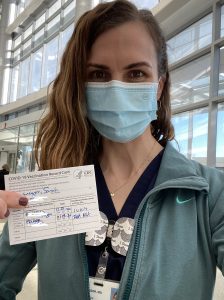National Immunization Awareness Month is observed each August to highlight the importance of vaccinations for people of all ages. As a family physician, talking about immunizations is a part of my daily life. It is an every day topic of conversation with my patients. Vaccines are the best defense we have against many serious diseases, and I do not take that lightly.
During the 20th century, overall health in the United States improved drastically. Life expectancy increased by 30 years during this time period, mainly due to advances in public health. During this time period, some of the major public health achievements were clean water & improved sanitation practices, motor vehicle safety, healthier mothers & babies, recognizing risks of tobacco, and – you guessed it – immunizations.
Routine Childhood Immunizations
Routine childhood vaccinations help prevent 14 different diseases before the age of 2. Without these vaccines, thousands of children would be paralyzed from polio each year, and thousands more infants would die from pertussis (whooping cough). Haemophilus influenza type b (Hib) would lead to meningitis in over 10,000 more – which could lead to brain damage or death. Immunizations are not only good at protecting your child, but they are important for protecting others in the community as well – for example, babies who are too young to be vaccinated.
It is predicted that among children born between 1994 and 2018, vaccines will prevent 936,000 early deaths, 8 million hospitalizations, and 419 million illnesses.
The next round of routine vaccinations your child will receive is around age 4-6. These immunizations are all completing or boosting series that were started in the infant period. This comes at an important time before heading off to kindergarten.
In the preteen and teen years, children receive Tdap (which boosts prior infant immunities to tetanus, diphtheria, and pertussis) as well as immunizations for meningitis and HPV.
The HPV vaccine (Gardasil) protects against the 9 most high-risk types of human papillomavirus. We care about HPV because it is the cause of almost all cervical cancers and can lead to other cancers such as penile, vaginal, vulvar, anal, and throat cancers. As a society, we are constantly talking about how cancer sucks (it really does!) and what we can do to prevent or cure it. Here we are blessed with a safe and effective immunization that can prevent these HPV-associated cancers! HPV is a sexually transmitted virus, so the goal is to vaccinate children before they ever become sexually active. This vaccine series is typically started around 11 years old. Bonus – if a child receives the vaccine on time, they only need 2 doses 6 months apart. If vaccination is delayed until age 15 or later, three doses will be needed.
Flu Vaccines
Every year around this time, our immunization awareness circles back to focus on the importance of annual vaccination against influenza. It is important for all children 6 months & older and all adults (including pregnant women and individuals with chronic illnesses) to be vaccinated each year. There are very rare cases where someone would not be indicated for a flu shot – essentially only infants under 6 months and people with severe, life-threatening allergies to ingredients in the vaccine.
Vaccination against the flu is important to protect yourself as well as decrease the spread of influenza to young babies who cannot yet be vaccinated and individuals with certain health issues who may not be able to mount as robust of an immune response to their own immunization.
Adult Immunization Awareness
We focus a lot on immunization awareness for children, but there are important vaccinations in adulthood that should not be overlooked.
As discussed above, all children should receive Tdap around age 11. For many people, this may be the only Tdap they ever need, but they should receive a tetanus booster shot at least every 10 years. There are some cases – such as a dog bite or bad/dirty cut – where an individual may require an early booster. Pregnant women require an additional Tdap during the 3rd trimester of each pregnancy as this can actually pass some immunity to the baby – super cool!
For adults age 50 and older, there is a vaccination called Shingrix, which is very good at preventing Shingles. Shingles are the reactivation of the chickenpox virus. It causes a painful rash that can lead to chronic nerve pain.
The pneumococcal polysaccharide vaccine (Pneumovax) protects against pneumococcal infections that can cause pneumonia, meningitis, and bloodstream infections. This should be given to all adults age 65 and older, but an earlier dose should be given to adults with certain risk factors such as asthma, COPD, diabetes, or people who smoke. Certain risk factors, such as immunocompromised individuals, may also require an additional dose of a different pneumococcal vaccine called Prevnar.
Immunization against COVID-19
The unfortunate circumstance of our current global pandemic has led to incredible collaboration and scientific advances providing us with multiple vaccinations to help prevent COVID-19 illness. These vaccines are safe, effective, and free. They are great are preventing you from getting COVID, and are exceptional at preventing severe illness, long-term complications, and death from the disease.
The safety monitoring system for tracking side effects from the COVID vaccines is the most intensive safety monitoring of immunizations in US history. Over 342 million doses have been given in the US since December 2020. This was after 10s of thousands received doses during clinical trials earlier in 2020.
Severe side effects are exceptionally rare. Vaccine monitoring has historically shown that side effects from immunizations occur within 6 weeks of receiving a vaccine. The good news is that vaccine trials lasted longer than 6 weeks. We have had several months of monitoring millions of additional people who have received vaccines outside of the trials. In all the history of vaccines, there has never been a long-term side effect that showed up months or years later.
Knowing there is any risk can feel scary, but the potential risk from COVID infection far outweighs the rare side effects identified with COVID vaccines.
The toll of the COVID-19 pandemic worldwide has been devastating. Vaccination is important to protect yourself and others around you who may be unable to be vaccinated or unable to produce the proper immune response to their own immunization. Even if you have previously been sick with COVID-19 infection, no matter how severe, it is important for you to be vaccinated if eligible as the natural immunity your body produces can wane – sometimes over a matter of a few months. If a large percentage of the population can get vaccinated, less virus will be circulating. This means less opportunity for variants to arise  and fewer breakthrough cases. And eventually, I hope, a return to a life we recognize as “normal.”
and fewer breakthrough cases. And eventually, I hope, a return to a life we recognize as “normal.”
Immunization awareness is important throughout the whole year, but I’m glad for this annual reminder. If you or your family members are due for vaccines or have questions, reach out to your primary care physician for an appointment. If you don’t have a PCP, there is no time like the present. We’re here to help!








